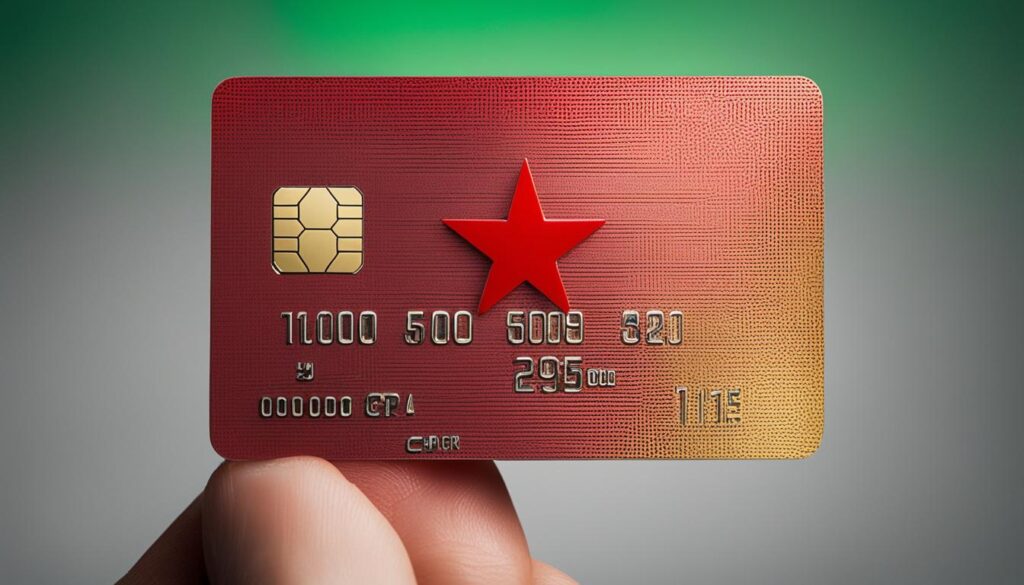Store credit cards offer more than just a line of credit. They come with exclusive perks, rewards programs, and potential credit implications that can greatly impact your personal finances. Let’s explore the lesser-known aspects of store credit cards and what you need to know.
Key Takeaways:
- Store credit cards offer hidden perks and rewards programs.
- Using store credit cards can have credit implications.
- Consider your finances before getting a store credit card.
- Use store credit cards responsibly to maintain a healthy financial situation.
- Understanding store credit cards can help you make informed financial decisions.
The Benefits of Store Credit Cards
Store credit cards offer more than just a line of credit. They provide a variety of benefits and exclusive perks that can enhance your shopping experience. Let’s dive into the advantages of having a store credit card.
Rewards and Discounts
One of the key benefits of store credit cards is the opportunity to earn rewards and enjoy discounts that are unique to the specific store or brand. These rewards can come in the form of cashback, points, or store credits, allowing you to save money on your purchases.
With store credit cards, you often have access to exclusive offers and promotions. This means you can take advantage of special discounts, early access to sales, or even receive free shipping on your orders. These exclusive perks can enhance your shopping experience and help you save money.
Some store credit cards also come with loyalty programs that reward frequent shoppers. You may earn additional discounts, VIP treatment, or even receive birthday surprises. These loyalty programs not only incentivize you to shop at the store regularly but also provide additional value and appreciation for your loyalty.
“Having a store credit card allows me to enjoy exclusive discounts and rewards every time I shop. The cashback rewards and special offers really add up, making it a worthwhile investment for me.” – Lisa, a satisfied store credit cardholder.
Convenience and Flexibility
Store credit cards often come with added convenience and flexibility. You can easily manage your purchases, view transactions, and make payments online or through a dedicated mobile app. This streamlines your shopping experience and provides greater control over your finances.
Additionally, store credit cards typically offer flexible payment options. You may have the choice to pay in full or in installments, depending on the terms and conditions of the card. This gives you the freedom to manage your payments according to your financial situation.
Building Your Credit History
Using a store credit card responsibly can also help you build or improve your credit history. Regularly making payments on time and keeping your credit utilization low demonstrates responsible credit management to lenders and credit bureaus. Over time, this can positively impact your credit score and open doors to better financial opportunities.
In conclusion, store credit cards offer a range of benefits including rewards, discounts, exclusive offers, loyalty programs, convenience, flexibility, and the opportunity to build your credit history. If you frequently shop at a particular store or brand, a store credit card can provide additional value and enhance your overall shopping experience.
Credit Implications of Store Credit Cards
Store credit cards can have a significant impact on your credit score and overall creditworthiness. It is important to understand the potential implications before applying for a store credit card. Here are some key factors to consider:
Credit Check and Temporary Impact
When you apply for a store credit card, the issuer will perform a credit check to assess your creditworthiness. This credit check can have a temporary impact on your credit score. It is essential to be aware of this potential temporary dip in your credit score and plan accordingly.
Lower Credit Limits
Store credit cards often come with lower credit limits compared to traditional credit cards. This means that you will have a lower available credit limit on the store credit card. It is important to manage your credit utilization carefully to avoid maxing out your available credit and potentially negatively impacting your credit score.
High Annual Percentage Rates (APRs)
Store credit cards often have higher Annual Percentage Rates (APRs) compared to traditional credit cards. This means that if you carry a balance on your store credit card, you may be subject to higher interest charges. It is crucial to understand the APR of the card and make timely payments to avoid accumulating debt and paying more in interest.
Manage Your Debt Responsibly
When using a store credit card, it is crucial to manage your debt responsibly. Make timely payments to avoid late fees and penalties. Keeping your credit utilization ratio low, ideally below 30% of your available credit, can help maintain a good credit standing. Regularly monitoring your credit card statements and tracking your spending can help you stay on top of your financial obligations. By doing so, you can avoid falling into unnecessary debt and maintain a healthy credit score.
| Credit Implications of Store Credit Cards | |
|---|---|
| Credit Check | Temporary impact on your credit score |
| Credit Limits | Lower than traditional credit cards |
| Annual Percentage Rate (APR) | Higher compared to traditional credit cards |
| Debt Management | Timely payments, low credit utilization |
Note: The table above summarizes the credit implications of store credit cards.

Understanding the credit implications of store credit cards is crucial for responsible financial management. By being aware of these factors, you can make informed decisions when utilizing store credit cards to avoid potential pitfalls and maintain a healthy credit score.
Considerations Before Getting a Store Credit Card
Before applying for a store credit card, it’s crucial to evaluate various factors to ensure that it aligns with your financial goals and needs. Consider the following key aspects:
- Spending Habits: Take a close look at how you spend your money. If you frequently shop at a specific store, a store credit card may provide extra benefits and rewards. However, if you prefer to shop at various locations or online, a general-purpose credit card with cashback rewards may be more suitable.
- Interest Rates and Fees: Thoroughly review the interest rates and fees associated with the store credit card. Compare them with other credit card options to ensure you’re getting the best deal. High interest rates can lead to significant costs if you carry a balance from month to month.
- Terms and Conditions: Carefully read through the terms and conditions of the store credit card. Pay attention to details such as grace periods, late payment fees, and penalties. Understanding these terms will help you make informed decisions and avoid any surprises down the line.
While store credit cards can be enticing, it’s essential to also consider alternative options. General-purpose credit cards offered by major banks often come with competitive rewards programs and promotional offers. These cards provide flexibility and can be used at various stores.
Here’s a comparison table illustrating key considerations before getting a store credit card:
| Considerations | Store Credit Cards | General-Purpose Credit Cards |
|---|---|---|
| Interest Rates | Varies by store | Varies by card issuer |
| Annual Fees | Some store credit cards have annual fees | Varies by card issuer |
| Rewards Program | Unique rewards and discounts at the specific store | Cashback rewards or points programs |
| Acceptance | Limited to the store or affiliated merchants | Accepted at various stores and worldwide |
Remember, taking the time to compare and assess different credit options is essential in making an informed decision. By considering your spending habits, interest rates, fees, and alternatives, you can choose the credit card that best suits your needs and financial goals.

Tips for Using Store Credit Cards Wisely
To make the most of store credit cards, it’s important to use them responsibly. Follow these tips to ensure that you’re maximizing the benefits while maintaining a healthy financial situation.
- Create a Budget: Before using your store credit card, create a budget that outlines your monthly expenses and income. This will help you determine how much you can afford to spend and ensure that you can make the necessary payments on time.
- Avoid Carrying a Balance: Whenever possible, pay off your store credit card balance in full each month. By doing so, you’ll avoid interest charges and keep your overall debt in check.
- Keep Credit Utilization Low: Your credit utilization ratio is the percentage of your available credit that you’re currently using. To maintain a healthy credit score, it’s recommended to keep your utilization below 30%. This means not maxing out your store credit card or using it for all your purchases.
- Regularly Review Statements: Take the time to review your store credit card statements regularly. This will help you stay on top of your spending and identify any unauthorized charges or errors.
- Track Your Spending: Keep a record of your store credit card purchases and track your spending. This will help you stay within your budget and avoid overspending.
By following these tips for responsible use, you can enjoy the benefits of store credit cards without compromising your financial stability.
Pros and Cons of Using Store Credit Cards
| Pros | Cons |
|---|---|
| Rewards and Discounts: Store credit cards often offer exclusive rewards, discounts, and special offers that can save you money. | Potential Credit Implications: Store credit cards can impact your credit score and creditworthiness if not managed responsibly. |
| Convenience: Store credit cards can make shopping at your favorite stores more convenient by providing a dedicated line of credit. | Higher Interest Rates: Store credit cards generally have higher interest rates compared to traditional credit cards, which can lead to increased debt if not paid off in full. |
| Special Financing Offers: Some store credit cards offer promotional financing options, such as interest-free periods, which can be beneficial for large purchases. | Limited Usability: Store credit cards can typically only be used at a specific store or group of stores, limiting their utility compared to general-purpose credit cards. |

Using store credit cards wisely is a balancing act that requires responsible budgeting, disciplined payment habits, and careful consideration of utilization. Remember, the key is to reap the benefits of store credit cards while maintaining a healthy financial situation.
Are Store Credit Cards and Loyalty Programs Similar in Terms of Hidden Information?
Store credit cards and loyalty programs may seem similar, but they differ in terms of hidden information. While store credit cards focus on financing options, loyalty programs provide valuable customer data and insights. These insights help businesses understand customer behavior and tailor their strategies to enhance customer satisfaction and loyalty.
Conclusion
Store credit cards can be a valuable tool for consumers looking to maximize their rewards and take advantage of exclusive offers. However, it’s important to approach these cards with caution and understand the potential impact on your financial management and credit score.
By carefully considering the benefits and drawbacks of store credit cards, you can make informed decisions that align with your overall financial goals. Remember to always prioritize responsible credit utilization and timely payments to avoid potential debt and negative credit implications.
Additionally, regularly monitoring your credit score and reviewing your credit card statements can help you stay on top of your financial obligations. By practicing good financial management and using store credit cards wisely, you can reap the rewards they offer while maintaining a healthy credit score.
FAQ
How do store credit cards benefit me?
Store credit cards offer exclusive perks, rewards programs, and discounts that are unique to the specific store or brand. These can include cashback rewards, special discounts, exclusive access to sales or events, and loyalty programs that reward frequent shoppers.
How can store credit cards impact my credit?
When you apply for a store credit card, the issuer will perform a credit check, which can temporarily impact your credit score. Store credit cards often have lower credit limits compared to traditional credit cards, so managing your credit utilization and making timely payments is crucial for maintaining a good credit standing. Additionally, store credit cards tend to have higher Annual Percentage Rates (APRs), which can result in higher interest charges if you carry a balance.
What should I consider before applying for a store credit card?
Before applying for a store credit card, it’s important to evaluate your spending habits and financial goals. Consider the interest rates, fees, and terms associated with the card to ensure it aligns with your needs. It’s also worth exploring alternative options, such as general-purpose credit cards that offer cashback rewards or other perks that may suit your preferences better. Take the time to compare and assess the pros and cons of different credit options before making a decision.
How can I use store credit cards responsibly?
To use store credit cards responsibly, create a budget and stick to it, ensuring you can afford to make the necessary payments on time. Avoid carrying a balance to prevent interest charges from accumulating. Keep your credit utilization ratio low by not maxing out your available credit. Regularly review your statements and track your spending to stay on top of your financial obligations.
What are the potential credit implications for store credit cards?
Store credit cards can impact your credit score and overall creditworthiness. When you apply for a store credit card, the issuer will perform a credit check, which can have a temporary impact on your credit score. Additionally, store credit cards often have lower credit limits compared to traditional credit cards. It’s important to manage your credit utilization and make timely payments to maintain a good credit standing. Furthermore, store credit cards tend to have higher Annual Percentage Rates (APRs), which can lead to higher interest charges if you carry a balance.
Should I prioritize my overall financial management or the rewards offered by store credit cards?
While store credit cards can provide unique benefits and rewards, it’s essential to prioritize your overall financial management and credit score. Consider the long-term implications of your credit decisions and ensure that any rewards or perks align with your financial goals. It’s important to maintain a healthy financial situation while taking advantage of the rewards that store credit cards offer.
Source Links
- https://www.fool.com/the-ascent/credit-cards/articles/3-reasons-youre-going-to-regret-getting-a-store-credit-card/
- https://www.fool.com/the-ascent/credit-cards/articles/7-reasons-not-get-store-credit-card/
- https://www.consumerreports.org/store-credit-cards/think-twice-before-signing-up-for-store-credit-card/

